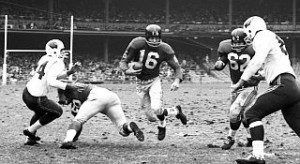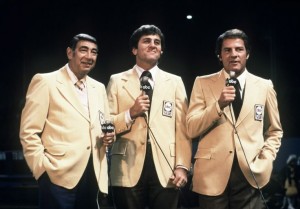Frank Gifford Was A Legend On the Field and In the Booth
The sports world has lost a sports legend with the passing on Sunday of former New York Giants Hall of Famer Frank Gifford at the age of 84.
A star at the University of Southern California and then on one of the glamour teams in the NFL, Gifford went on to become a key part of the most talked about announcing trio in football history.
A native Californian, Gifford attended Bakersfield High School and Bakersfield Junior College before becoming an All-American halfback for the Trojans.
Selected by the New Yok Giants in the first round of the 1952 NFL Draft, Gifford immediately became an important building block on a Giants team that by 1956 was among the best in the NFL.
Initially playing both offense and defense, Gifford earned Pro Bowl honors in just his second season. He would go on to earn Pro Bowl honors for seven straight years and was a four-time first team All-Pro.
In 1956 Gifford was named the NFL MVP as he rushed for a career-high 819 yards and led the NFL with 1,422 yards from scrimmage. The Giants won the World Championship with a dominating 47-7 victory over the Chicago Bears in which Gifford caught passes for 131 yards and a touchdown and also had 30 yards rushing.
The Giants reached back-to-back NFL Championship Games in 1958 and 1959, but lost both times to the Baltimore Colts.
In the 1958 Championship Game, which is often referred to as the Greatest Game Every Player, Gifford rushed for sixty yards and had a receiving touchdown.
Always a threat as both a runner and receiver, Gifford also could throw the ball on occasion to provide the Giants, including their longtime offensive coordinator Vince Lombardi, with even more options.
Gifford’s career took an unexpected turn in 1960 when a devastating hit by Philadelphia Eagles linebacker Chuck Bednarik knocked him unconscious and ultimately led to him missing the entire 1961 season.
He returned in 1962 and though he was used primarily as a receiver, helped lead the Giants to back-to-back appearances in the NFL Championship Game.
Gifford was named the 1962 NFL Comeback Player of the Year and in 1963 he earned his eighth Pro Bowl selection.
Following the 1964 season, Gifford retired from the NFL with 3,609 rushing yards (4.3 yards per carry), 5,434 receiving yards (367 receptions) and 9,043 total yards from scrimmage. He also had 823 yards passing with 14 touchdowns.
During his career, Gifford had made numerous television appearances in the popular New York market, so it was natural that he transitioned full-time to television broadcasting after he retired.
He was a member of the CBS Broadcasting team for several years before moving into the broadcast booth for the second year of ABC’s Monday Night Football. He would go on to team with Howard Cosell and Don Meredith to turn weeknight football into a television staple.
Gifford would outlast his original partners and ultimately spend 26 years in the broadcast booth for Monday Night Football.
While with ABC he expanded his broadcasting beyond football as he was a regular part of several Olympic Broadcasts. He was one of the announcers for the controversial 1972 Men’s Basketball Gold Medal Game between the United States and Russia. He also announced several jumps by daredevil Evel Knievel.
It was while serving as a substitute host on ABC’s Good Morning America that he met his future wife Kathie Lee Johnson. She (as Kathie Lee Gifford) would go on to have her own successful television career and they became a very popular glamour couple.
Gifford was inducted into the Pro Football Hall of Fame in 1977 and is also a member of the College Football Hall of Fame.







best looking ever.
Thanks for this information, may be useful for all readers on this website